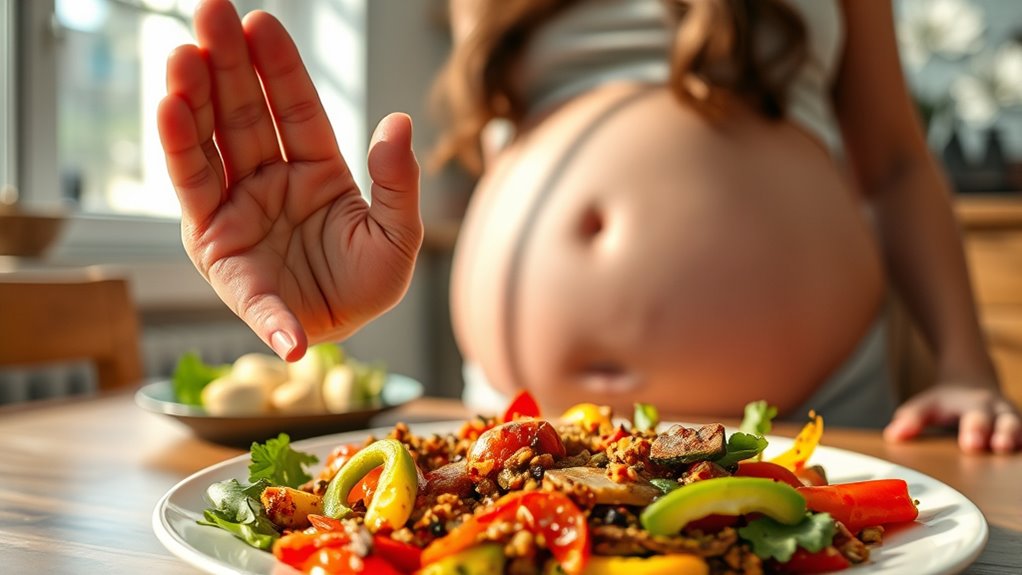During pregnancy, you might experience taste aversions due to hormonal changes, particularly the rise in hCG levels, which can heighten your senses of smell and taste. Commonly, foods like eggs, dairy, and red meat may suddenly seem unappealing. This can serve as a protective mechanism for your developing baby as well. Understanding these changes can help you navigate your shifting preferences. There’s more to uncover about managing these aversions effectively.
Key Takeaways
- Hormonal changes, particularly increased hCG levels, significantly influence taste preferences during pregnancy.
- Heightened senses of smell and taste can lead to strong aversions to certain foods.
- Psychological factors and cultural influences can shape food preferences and aversions.
- Food aversions may serve as a protective mechanism for the developing fetus.
- Nutritional imbalances can contribute to the development of food aversions during pregnancy.

Pregnancy can bring about a whirlwind of changes, and one of the most surprising might be the sudden food aversions you experience. These intense dislikes for certain foods can hit hard, often leaving you feeling nauseous or gagging at the mere thought of them. Up to 90% of women report cravings during pregnancy, but many also face the challenge of food aversions, particularly in the first trimester when morning sickness is at its peak. You might find yourself turning your nose up at strong-smelling foods like garlic and onions, which can be frustrating and confusing.
So, what causes these food aversions? Hormonal changes play a significant role, especially the rise in hCG levels. This hormone can heighten your senses of smell and taste, making some foods incredibly unappealing. Psychological and cultural factors also come into play, influencing your food preferences during this time. Interestingly, some experts propose that these aversions could be nature’s way of protecting your developing fetus from potentially harmful substances. Nutritional deficits or imbalances might further contribute to the foods you find unappetizing.
Common aversions often include eggs, dairy products, and meat, especially red meat. You might also steer clear of spicy foods, coffee, and anything greasy. As these aversions take hold, it’s crucial to be mindful of your nutritional intake. Pregnant women need a well-rounded diet rich in vitamins and minerals, and avoiding healthy foods like vegetables can impact fetal development. If you find yourself struggling to maintain a balanced diet, consulting a healthcare provider becomes essential.
Food aversions often coincide with morning sickness and heightened nausea. The peak of these aversions typically aligns with the highest levels of hCG in your body. Managing nausea can help lessen the intensity of your food aversions. Simple strategies like eating small, frequent meals or opting for bland foods may offer relief. Staying hydrated with cold or frozen drinks can also help ease symptoms.
Managing nausea through small, frequent meals and hydration can help alleviate food aversions during pregnancy.
While the exact mechanisms behind food aversions remain a mystery, understanding their potential causes can empower you. Being proactive about your nutrition and seeking alternative sources of essential nutrients is vital if aversions persist. Remember, you’re not alone in this journey, and addressing these changes can help ensure both your health and your baby’s development during pregnancy.
Frequently Asked Questions
Can Taste Aversions Affect My Partner During Pregnancy?
Taste aversions during your pregnancy don’t directly affect your partner, but they can create some changes in your shared lifestyle.
If you avoid certain foods, your partner might need to adjust their meals or dining choices to support you.
It’s essential to communicate openly about your cravings and aversions, so they can help you navigate this time.
Emotional support is key, as you both experience this significant change together.
Do Taste Aversions Change With Each Trimester?
As you journey through pregnancy, taste aversions can shift like the tides.
In the first trimester, you might find yourself dodging eggs and dairy, while the second might toss in a mix of cravings and lingering dislikes.
By the third trimester, many of those aversions may wane, leaving you to navigate a changing culinary landscape.
Each trimester brings its own flavors, so staying adaptable is key to enjoying your meals.
Are There Any Remedies for Severe Taste Aversions?
If you’re dealing with severe taste aversions, there are several remedies you can try.
Start by avoiding trigger foods and opting for bland options like rice or oatmeal. Small, frequent meals might help, too.
Cold foods often feel more tolerable, and herbal teas like ginger can alleviate nausea.
Ensure you’re staying hydrated and consider taking prenatal vitamins to cover any nutritional gaps.
If symptoms persist, consulting with your healthcare provider is essential.
How Long Do Pregnancy Taste Aversions Typically Last?
Pregnancy taste aversions typically start in the first trimester and can peak during the second.
While many women notice these aversions fade by the third trimester, some might experience them throughout their pregnancy or even beyond.
It’s important to pay attention to your body’s signals and adapt your diet accordingly.
You’ll likely find that certain foods you once loved become unappealing, and that’s perfectly normal during this time.
Can Taste Aversions Lead to Nutritional Deficiencies?
Yes, taste aversions can definitely lead to nutritional deficiencies. When you avoid certain foods, you might miss out on essential nutrients your body needs.
It’s crucial to ensure you’re still getting a balanced diet, even if some foods seem unappetizing. Consider taking prenatal vitamins to help fill any gaps.
Staying in touch with your healthcare provider can help you find solutions and maintain your nutrition during this time.
Conclusion
In the whirlwind of pregnancy, taste aversions can feel like an unexpected storm, sweeping away your cravings and leaving confusion in its wake. Understanding the body’s changes can help you navigate these strange culinary waters. Remember, these aversions are often temporary and a natural response to protect both you and your baby. Embrace this unique journey, and don’t hesitate to explore new flavors that might just surprise you. Your taste buds might find their way back home.









